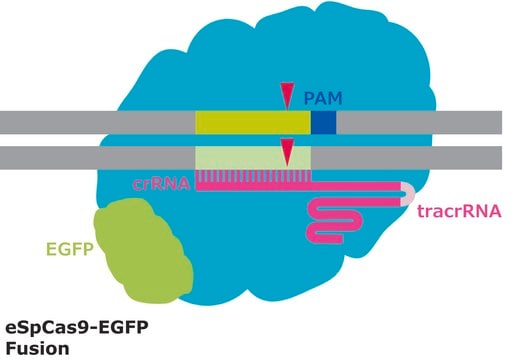G1921
Glypican 3 human
recombinant, expressed in NSO cells
Sign Into View Organizational & Contract Pricing
All Photos(1)
About This Item
UNSPSC Code:
12352202
NACRES:
NA.26
Recommended Products
biological source
human
Quality Level
recombinant
expressed in NSO cells
Assay
≥97% (SDS-PAGE)
form
lyophilized powder
UniProt accession no.
storage temp.
−20°C
Gene Information
human ... GPC3(2719)
General description
Glypican-3, a cell surface protein, is highly expressed in hepatocellular carcinoma (HCC) and few other human cancers including melanoma. It is a heparan sulfate proteoglycan and is present on the cell surface. Under non-reducing conditions in SDS-PAGE, the glycanated glypican 3 appears as a smear with an apparent molecular mass of 60 - 100 kDa†
Biochem/physiol Actions
Sulfate proteoglycan attached to the cell surface by a glycosylphosphatidylinositol (GPI) anchor. Regulates cell survival and inhibits cell proliferation during normal development. Potential use as marker for early disease detection.
Physical form
Lyophilized from a 0.2 μm filtered solution in PBS containing 50 μg of bovine serum albumin per 1 μg of cytokine.
Storage Class Code
13 - Non Combustible Solids
WGK
WGK 2
Flash Point(F)
Not applicable
Flash Point(C)
Not applicable
Choose from one of the most recent versions:
Already Own This Product?
Find documentation for the products that you have recently purchased in the Document Library.
Yu-Liang Wang et al.
World journal of gastroenterology, 18(19), 2408-2414 (2012-06-02)
To investigate the diagnostic value of glypican-3 (GPC3) and its relationship with hepatocellular carcinoma (HCC) recurrence after liver transplantation. HCC tissue samples (n = 31) obtained from patients who had undergone liver transplantation were analyzed. GPC3 mRNA and protein expression
Restriction enzyme cleavage of UV-irradiated DNA: a comparison of far-UV and mid-UV wavelengths.
S P Moore et al.
Photochemistry and photobiology, 45(2), 253-263 (1987-02-01)
Shiro Suzuki et al.
Human vaccines & immunotherapeutics, 10(2), 338-343 (2013-11-21)
Carcinoembryonic antigen glypican-3 (GPC3) is expressed by>40% of ovarian clear cell carcinoma (CCC) and is a promising immunotherapeutic target. We previously reported the safety of and immunological and clinical responses to a GPC3-derived peptide vaccine in a phase I clinical
Our team of scientists has experience in all areas of research including Life Science, Material Science, Chemical Synthesis, Chromatography, Analytical and many others.
Contact Technical Service








